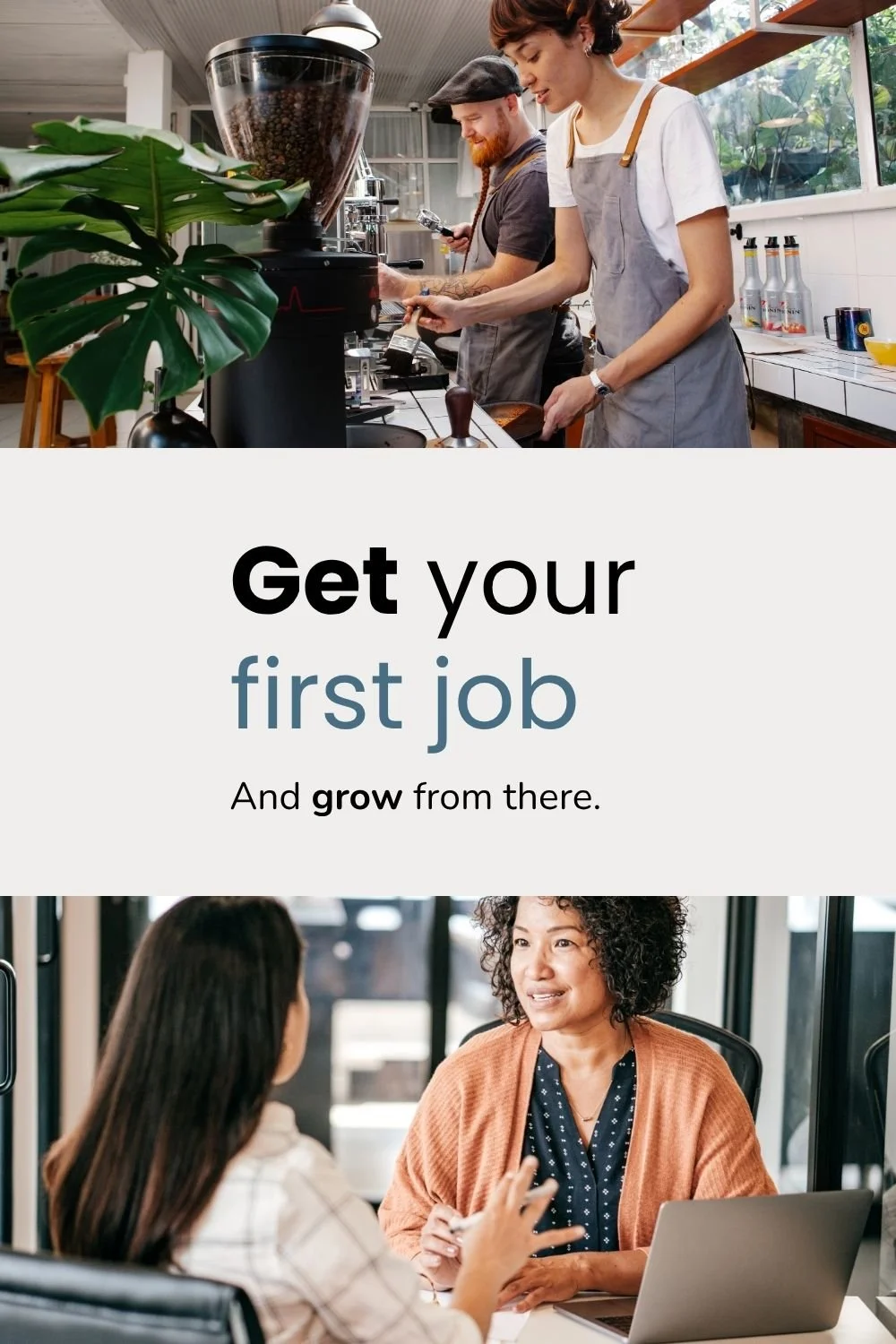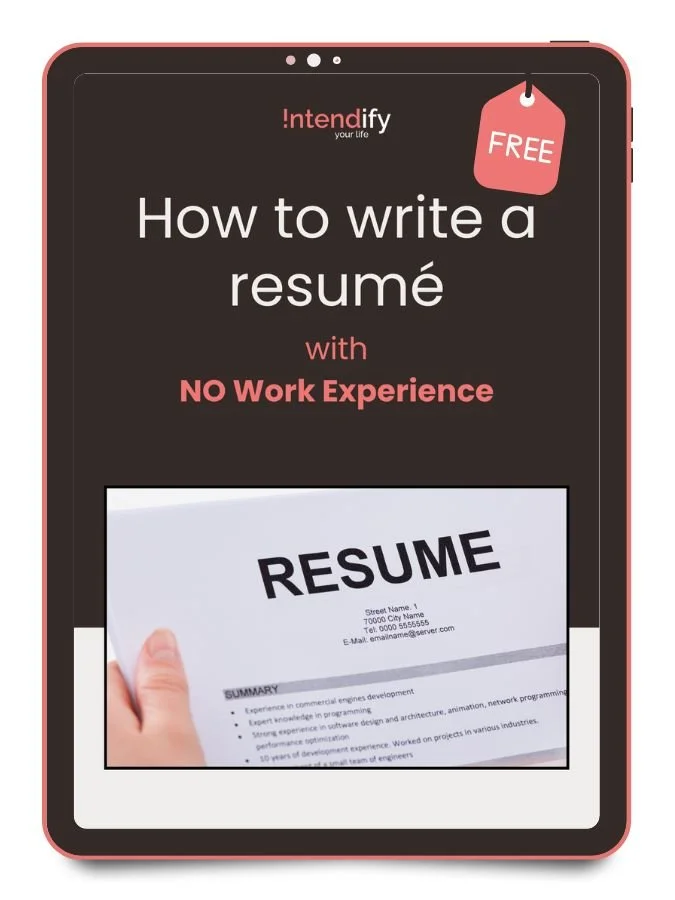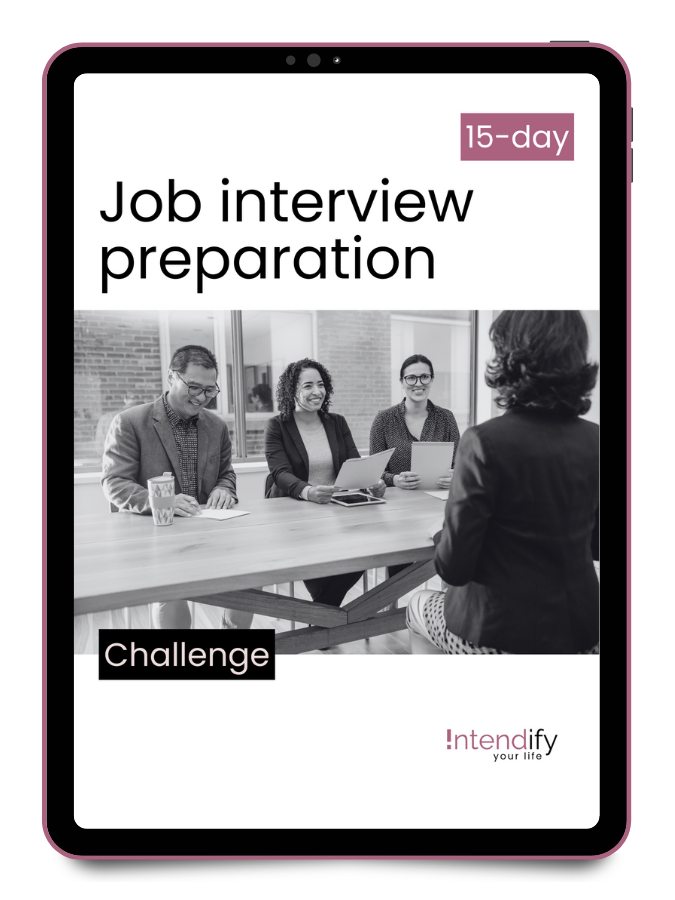Get your first job and grow from there
This guide isn’t theory. It’s shaped by years of coaching sessions, real conversations, and the practical shifts that people tested until they found what actually works.
Your step-by-step guide to landing that first role, and thriving beyond it.
By the end of this guide, you’ll understand the purpose of a first job, know how to highlight the skills you already have, and feel equipped with practical steps to land and grow in your first role. You’ll find reflection exercises, specific examples, and simple missions that you can start today.
Step 1: Understand the purpose of your first job
A first job isn’t about landing your dream career right away. It’s a stepping stone that serves three critical purposes:
Experience: Learning how to follow instructions, manage your time, and work within a system.
Income: Earning your own money, even if it’s not a lot, builds independence and teaches financial responsibility.
Insight: Each job reveals something about what energizes you and what doesn’t. This intel helps you make better choices down the road.
One client of mine started out at a local fast-food restaurant. She didn’t love the greasy uniforms or late shifts, but she discovered that she thrived in fast-paced environments and really enjoyed training new staff. That clue nudged her toward hospitality management, which became her long-term career.
Reflection activity
What do you want your first job to do for you (other than a paycheck)? Is it gaining confidence, practicing customer service, or just proving to yourself you can handle responsibility?
Write down one skill you’d like to strengthen and one thing you’d like to learn about yourself.
Step 2: Figure out what might be holding you back
Before you move forward with job applications, it’s worth pausing to ask: Is there something holding me back? Most first-time job seekers struggle with the same four barriers: fear, assumptions, expectations, and desires. Naming which one resonates with you will help you move through it.
Fear: What if I mess this up?
Fear of failure is one of the biggest blocks for new job seekers. You might worry about embarrassing yourself in an interview, not being able to handle the work, or making mistakes in front of others. What most people don’t realize is that employers already expect beginners to make mistakes. What matters is how you respond when you do, by asking questions, showing you’re willing to learn, and improving over time.
One of my clients froze in her first week at a retail job when a customer asked her a question she didn’t know the answer to. After taking a breath, she said, “That’s a great question. Let me double-check with my manager so I can give you the right info.” The customer was satisfied, and her manager praised her for handling it honestly. That moment taught her that mistakes weren’t career-ending; they were part of learning on the job.
Reflection activity
What’s the “worst-case scenario” you imagine about getting a job?
Write it down, then ask yourself: What would I actually do in that situation? Often, you’ll realize the “scary” scenario has a simple solution.
Assumption: I can’t get hired without experience
This assumption holds back more people than any other. Job postings often list “1–2 years of experience,” which sounds like a dead end if you’ve never been employed. But in actuality, most employers consider life experience, too. Babysitting, volunteering, running school events, helping in a family business, and even leading a group project all show skills like responsibility, teamwork, and initiative.
A 2023 survey from Indeed found that 65% of employers are willing to hire candidates with no direct work experience if they show transferable skills and a willingness to learn.
| Everyday activity | Transferable skill | Resume-ready phrasing |
|---|---|---|
| Babysitting | Responsibility, conflict resolution | "Supervised and entertained two children, ensuring safety and managing conflicts calmly." |
| Volunteering at a food bank | Organization, customer service | "Organized donations and assisted over 50 families weekly." |
| Group project leader | Leadership, communication | "Coordinated team of 4 students, delegated tasks, and presented findings to class." |
Tiny mission
Make your own 3-row table like this. Write down an activity, the skill it demonstrates, and a “résumé-ready” sentence for it.
Expectation: I should hold out for something I love
Social media is filled with stories about people “doing what they love.” That pressure makes you believe your first job should be a dream role. But first jobs are stepping stones. They teach you what you like, what you don’t, and how the workplace operates. Loving it is a bonus (and rare), but not a requirement.
One young man I worked with hated his dishwashing job at a restaurant, but it gave him insight: He liked the food industry, but not being in the kitchen. A year later, he moved into a server role and eventually into catering management. If he had quit at the first sign of dislike, he would never have discovered his path forward.
Reflection activity
Instead of asking “Will I love this job?” ask: “What do I want this job to teach me?” That shift can turn a “bad” job into a useful stepping stone.
Desire: I want to feel proud of the work I’m doing
Everyone wants to feel proud of what they do. The good news? Pride doesn’t come from the job title; it comes from how you show up. Reliability, effort, and growth are what will make you feel proud, even if the role itself is simple.
A student who worked as a janitor told me he didn’t think his job mattered. But when he showed up on time every day and kept the building spotless, teachers and students often thanked him. That eventually helped him feel pride in himself and gave him the confidence to later apply for a security guard role, something he would have never tried otherwise.
Reflection activity
What personal value do you want to bring to any job: reliability, kindness, consistency, effort?
Write it down. That’s how you’ll feel proud, no matter the role.
Step 3: Take action (even if it feels awkward or scary). How to start applying step by step.
Now that you’ve unpacked the mindset barriers holding you back, let’s move into action. Think of this stage as building your starter toolkit: a focused search, a simple résumé, confident interview prep, and one concrete action you can take today.
Write your job-search mission statement
Most first-time job seekers scatter their energy by applying everywhere and burning out fast. A “job-search mission statement” is a one-sentence filter that keeps you focused. It saves time, reduces decision fatigue, and helps you target roles that actually fit your life right now.
Example mission statements:
“A part-time evening job that pays weekly and doesn’t require heavy lifting.”
“A full-time entry-level role where I can work with people and learn customer service.”
One of my clients applied to 40 jobs online with no results. When we crafted her mission statement: “A job where I can practice customer service skills and earn consistent weekend shifts,” it allowed her to focus only on retail stores and cafés near her. She applied to only 5 places in person and got 2 interviews. Think ‘quality’ over ‘quantity’.
Tiny mission:
Write your own job-search mission in one sentence. Keep it realistic and tied to your current stage of life.
Build your first résumé
A résumé for a first job is less about “years of experience” and more about demonstrating transferable skills. Employers care about whether you show initiative, reliability, and a willingness to learn. One page is plenty. What matters most is clarity.
A student who thought she had “nothing to put on a résumé” realized she had volunteered for three years at her church. Once we reframed it as “Coordinated children’s activities and managed 15 kids per session”, she was able to impress an employer who valued her reliability and hired her on the spot.
Tiny mission
Draft your first one-page résumé using your reframed experiences from the awareness stage. Use the free tools below to help you.
Example beginner résumé
Profile
Reliable student seeking part-time work to build customer service and teamwork skills.
Experience
Babysitter (2019–2023)
- Supervised two children regularly, ensuring safety and well-being.
- Prepared meals and managed schedules.
- Resolved conflicts calmly and effectively.
Volunteer – Food Bank (2022)
- Organized weekly donations for distribution.
- Assisted over 50 families per week with food access.
- Collaborated with a team of 10 volunteers.
Education
[Your school], expected graduation [year]
Skills
- Organization
- Customer Service
- Communication
- Teamwork
FREE Tool: Résumé action verbs guide
This guide contains tons of action verbs you can use in your résumé to impress potential employers.
FREE Tool: How to write a résumé without work experience
Most first jobs don’t actually require experience. They want someone reliable, teachable, and willing to work. That’s it. This guide will teach you how to find your skills and add them to your résumé.
Practice for the interview
Interviews test more than just your answers. They measure your confidence, attitude, and willingness to learn. The most common question you’ll face is: “Tell me about yourself.” A strong answer has three parts:
Who you are now (student, recent graduate, etc.).
A skill you bring to the job you’re applying for.
Why you want to work there.
Sample answers for beginners:
“I’m a high school senior looking for part-time work. I’m dependable and have shown that through volunteering at the library. I’d love to bring that same energy to your team.”
“I just graduated and I’m looking for my first role. I’ve helped run my school’s student council events, which taught me organization and teamwork. I’m excited to apply those skills here.”
One of my clients froze when asked, “Why should we hire you?” After we practiced, she learned to say: “I don’t have job experience yet, but I’m eager to learn, I’m reliable, and I’ll show up on time.” She got hired because the manager valued honesty and teachability.
Challenge yourself…
This 15-day challenge will help you prepare for upcoming job interviews so you’ll be ready for anything they throw at you.
Tiny mission
Write a 3-sentence answer to “Tell me about yourself.” Practice it out loud until it feels natural.
Take your first small action
The fastest way to kill momentum is waiting until you feel “ready.” Action creates readiness. Instead of aiming to land the perfect job, aim for one small step today.
Quick wins (choose one):
Apply to one posting that fits your mission statement.
Ask a teacher, family member, or coach if they know of any openings.
Walk into a business you frequent and ask politely if they’re hiring.
A student I coached last year delayed applying for weeks. We worked on his confidence, and then one day he walked into a hardware store and asked if they were hiring. They gave him an application, interviewed him the next day, and hired him the same week. His first job came from a 5-minute action, not a perfect résumé.
Tiny mission
Pick one action and commit to doing it within 24 hours. Write it down and schedule it if you have to.
Where to find online job postings
These job boards are a great resource for finding available jobs you can apply for.
Job Boards:
Helpful resources to explore
Books for first-time job seekers
*Get That Job! The Quick and Complete Guide to a Winning Interview by Thea Kelley
Great for helping first-timers prep thoughtful answers and present themselves with confidence.
*What Color Is Your Parachute? for Teens by Carol Christen and Richard N. Bolles
A friendly career workbook for young people that helps with goal setting and exploring job options.
*The 7 Habits of Highly Effective Teens by Sean Covey
Not job-specific, but a solid foundation for developing workplace habits like initiative, responsibility, and communication.
*Heads-up: Some of the links on this page are affiliate links, which means I may earn a small commission if you choose to make a purchase, at no extra cost to you. I only recommend tools and resources I genuinely believe are helpful. Thank you for supporting the work I do here.








